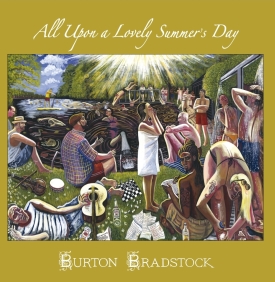Upon a Lovely Summer's Day - Burton Bradstock - F-IRECD58 (2012)
buy now
“All Upon a Lovely Summer’s Day” is the innovative debut album from Burton Bradstock; the stylistic alter ego of the multi-instrument musician and composer Jimmy Cannon and was born to present his newest creation. With one foot in the bucolic past and the other very firmly in the contemporary, “All Upon a Lovely Summer’s Day” sympathetically recasts English folk songs from the early to mid-19th century.
Burton Bradstock’s “All upon a Lovely Summer’s Day” is a journey of discovery that will surprise in its musical intensity and sincerity in delivery.
PERSONNEL
Burton Bradstock: vocals
Dorian Ford: piano
Riaan Vosloo: bass
Tim Giles: drums (except for tracks 4 and 11) Dave Ohm
Pete Barryman: guitar
Julian Ferraretto: violin
Special Guest: Iain Ballamy plays saxophone on John Barleycorn and She's Like a Swallow String
Strings:
Robin Martin
Joanne Davies
Nozomi Cohen
Rosalind Gladstone
String arrangements by Riaan Vosloo
Except for She’s Like the Swallow/Jerome Davies and Sally in the alley/J Cannon
TRACK-LIST
No |
|
Title |
Duration |
| 1 |
|
Salisbury Plain |
03:44 |
| 2 |
|
Train Song |
03:59 |
| 3 |
|
The Ashgrove |
05:25 |
| 4 |
|
The Foggy Foggy Dew |
04:14 |
| 5 |
|
Early One Morning |
05:13 |
| 6 |
|
John Barleycorn |
05:52 |
| 7 |
|
The Mermaid of Hampstead Heath |
04:04 |
| 8 |
|
All Things are Quite Silent |
03:31 |
| 9 |
|
Sally In Our Alley |
03:21 |
| 10 |
|
She’s Like a Swallow |
03:25 |
| 11 |
|
The Water is Wide |
04:00 |
THANKS
TECHNICAL INFO
LINER NOTES
The search for a sound inevitably leads to questions about tradition and identity and, for me, you could also add truth.
In asking these questions, Jimmy Cannon has alighted upon the English songbook, and so as Burton Bradstock he begins his journey.
Naturally, we must consider many great explorers of the English sound: Vaughan Williams and his inspirational incorporation of the great Elizabethan legacy, the Eton choir book and the Fitzwilliam Virginal Book - that modal sound world so powerful as to be part of our collective subconscious.
Benjamin Britten’s deft touches of modernism, which to me make his folk song arrangements an essential part of the canon, is another example.
And what of Jimmy’s English canon: Anne Briggs, Roy Harper, Fairport Convention, Martin Carthy, where does it begin and where does it end?
I’m searching for the fundamentals of sound, sense and story telling, which no doubt will lead back to the endless richness of English and Celtic balladry, poetry and the speech patterns themselves.
This album represents those of us who are at the foothills of that crooked journey up the personal mountain. Who will join us on this quest?
Dorian Ford.
REVIEWS
xxxxx
LINKS
www.f-ire.com
|
